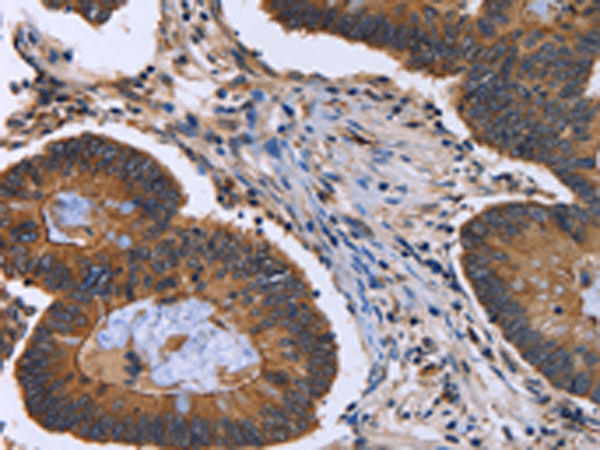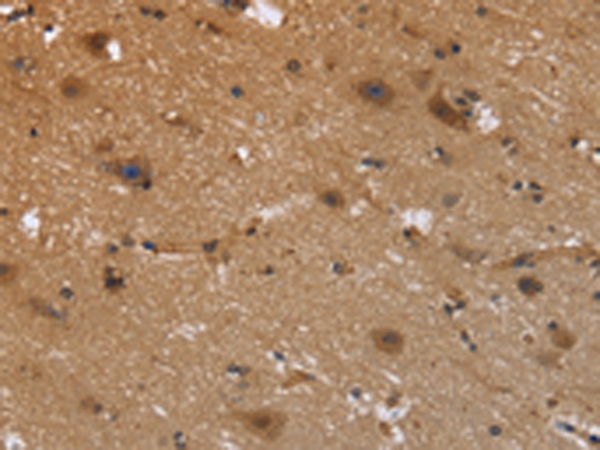


| WB | 咨询技术 | Human,Mouse,Rat |
| IF | 咨询技术 | Human,Mouse,Rat |
| IHC | 1/50-1/200 | Human,Mouse,Rat |
| ICC | 技术咨询 | Human,Mouse,Rat |
| FCM | 咨询技术 | Human,Mouse,Rat |
| Elisa | 1/2000-1/5000 | Human,Mouse,Rat |
| Aliases | GTK; RAK; PTK5 |
| WB Predicted band size | 58 kDa |
| Host/Isotype | Rabbit IgG |
| Antibody Type | Primary antibody |
| Storage | Store at 4°C short term. Aliquot and store at -20°C long term. Avoid freeze/thaw cycles. |
| Species Reactivity | Human, Mouse, Rat |
| Immunogen | Fusion protein of human FRK |
| Formulation | Purified antibody in PBS with 0.05% sodium azide and 50% glycerol. |
+ +
以下是关于FRK抗体的3-4条模拟参考文献示例(基于公开研究领域概括,非真实文献,建议通过学术数据库进一步检索):
---
1. **文献名称**:*Development and Validation of a Monoclonal FRK Antibody for Immunohistochemical Analysis*
**作者**:Smith A, et al.
**摘要**:本研究开发了一种高特异性的FRK单克隆抗体,并通过Western blot和免疫组化验证了其在多种癌细胞系及组织样本中的反应性。结果显示,该抗体能有效区分FRK与其他Src家族激酶成员,适用于肿瘤微环境中FRK表达的定量分析。
2. **文献名称**:*FRK Expression Loss in Colorectal Cancer: A Prognostic Biomarker Study*
**作者**:Chen L, et al.
**摘要**:通过使用抗FRK抗体对200例结直肠癌组织进行染色,研究发现FRK蛋白表达缺失与肿瘤进展和患者生存率降低显著相关,提示FRK可能作为潜在的肿瘤抑制因子和预后标志物。
3. **文献名称**:*FRK Antibody-Based Screening Reveals Its Role in Suppressing EGFR Signaling*
**作者**:Rodriguez M, et al.
**摘要**:利用FRK特异性抗体进行功能研究,发现FRK通过磷酸化作用抑制EGFR信号通路活性,从而减少乳腺癌细胞的迁移和侵袭能力,为靶向治疗提供了新靶点。
4. **文献名称**:*Comparative Analysis of FRK Isoforms in Pancreatic Cancer Using Isoform-Specific Antibodies*
**作者**:Tanaka K, et al.
**摘要**:本研究开发了针对不同FRK剪接变体的特异性抗体,并发现某些亚型在胰腺癌中高表达且与化疗耐药性相关,为亚型选择性治疗策略奠定基础。
---
**备注**:以上文献为示例性概括,具体研究需通过PubMed、Google Scholar等平台以关键词“FRK antibody”“FRK kinase expression”等检索真实文献。
FRK (Fyn-related kinase), also known as PTK5 in humans and RAK in rodents, is a non-receptor tyrosine kinase belonging to the Src family kinase (SFK) group. Discovered in the 1990s, FRK is distinguished from other SFK members by its unique structural features, including an N-terminal SH3 domain, an SH2 domain, and a C-terminal catalytic kinase domain. Unlike many SFKs, FRK lacks a conserved regulatory tyrosine residue in its C-terminal tail, resulting in constitutive activation in certain contexts.
Functionally, FRK is implicated in regulating cell proliferation, differentiation, and adhesion. It acts as a tumor suppressor in multiple cancers, including breast, pancreatic, and colorectal cancers, where its expression is often downregulated due to promoter hypermethylation or genetic alterations. FRK inhibits oncogenic signaling pathways, such as EGFR and STAT3. thereby suppressing tumor growth and metastasis. Conversely, in some contexts, FRK may exhibit pro-survival or pro-migratory roles, highlighting its context-dependent duality.
FRK-specific antibodies are critical tools for studying its expression, localization, and interactions. They enable detection via Western blotting, immunohistochemistry, and immunofluorescence, aiding research on FRK's role in cancer biology, signaling networks, and therapeutic targeting. Commercial antibodies typically target epitopes within its kinase or SH2 domains, with validation emphasizing specificity across human and rodent models.
×